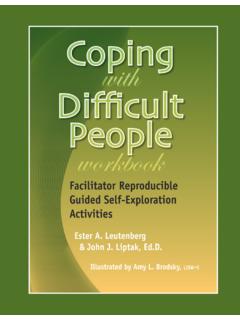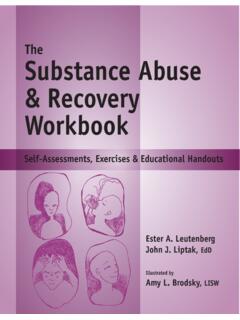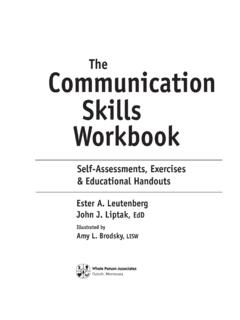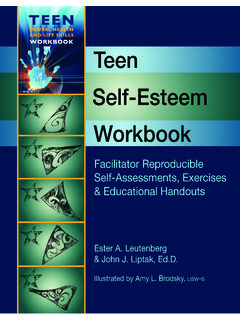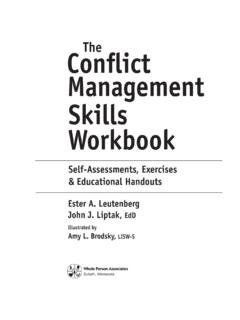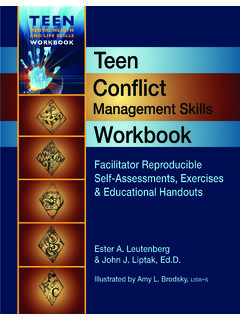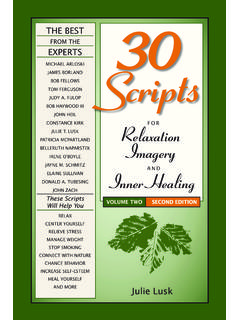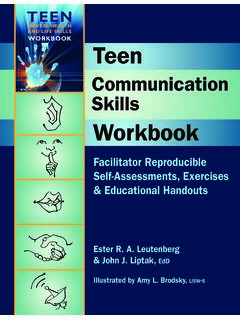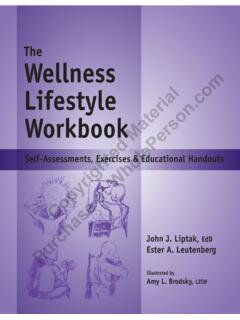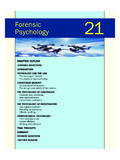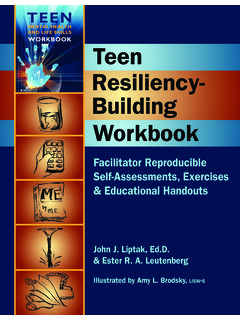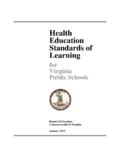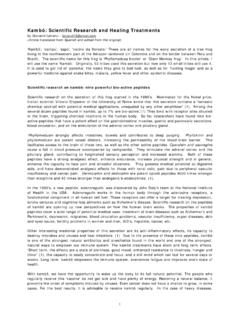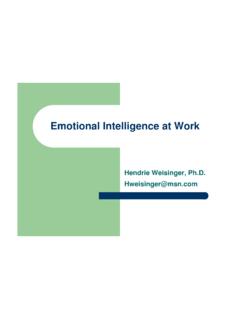Transcription of Mental HealtH and life SkillS Workbook Teen …
1 WorkbookFacilitator Reproducible Self-Assessments, Exercises & Educational HandoutsJohn J. Liptak, EdD Ester A. Leutenberg Illustrated byAmy L. Brodsky, LISW-STeenAngerDuluth, Minnesota Mental HealtH and life SkillS WorkbookteenFacilitator Reproducible Self-Assessments, Exercises & Educational HandoutsEster A. Leutenberg & John J. Liptak, by Amy L. Brodsky, l i s w-sAngerWorkbookTeenWhole Person 101 W. 2nd St., Suite 203 Duluth, MN Anger Workbook Facilitator Reproducible Self-Assessments, Exercises & Educational HandoutsCopyright 2011 by Ester A. Leutenberg and John J. Liptak. All rights reserved. Except for short excerpts for review purposes and materials in the assessment, journaling activities, and educational handouts sections, no part of this book may be reproduced or transmitted in any form by any means, electronic or mechanical without permission in writing from the publisher.
2 Self-assessments, exercises, and educational handouts are meant to be efforts have been made to ensure accuracy of the information contained in this book as of the date published. The author(s) and the publisher expressly disclaim responsibility for any adverse effects arising from the use or application of the information contained herein. Printed in the United States of America10 9 8 7 6 5 4 3 2 1 Editorial Director: Carlene Sippola Art Director: Joy Morgan DeyLibrary of Congress Control Number: 2010941185 ISBN: 978-1-57025-250-1(Continued)Using This Book (For the professional)One of the most difficult life SkillS teenagers need to learn is how to control anger. They will experience a wide variety of emotions and the more equipped they are to handle these emotions, the more successful they will be in school, friendships and family relationships.
3 Anger can be powerful and managing it can be challenging. The Teen Anger Workbook is designed to help teens engage in self-reflection, to examine their thoughts and feelings that lead to angry emotions, and learn effective tools and techniques to manage anger. This unique book combines two powerful psychological tools for anger management: self-assessment and journaling. The Teen Anger Workbook contains five separate sections that will help the participants learn more about themselves as well as how anger impacts their Anger Triggers Scale helps individuals to explore what triggers feelings of anger within Anger Intensity Scale helps individuals to identify how prone they are to anger, angry reactions and to the strength of their angry Anger Expression-Style Scale helps individuals to identify their particular ways of expressing their anger to others.
4 Teen Anger Consequences Scale helps individuals to explore adverse effects of uncontrolled anger in their relationships and Anger Management Scale helps individuals to better understand and develop SkillS in anger management. These sections serve as avenues for individual self-reflection, as well as group experiences revolving around identified topics of importance. Each assessment includes directions for easy administration, scoring and interpretation. In addition, each section includes exploratory activities, reflective journaling activities, insightful quotations, and educational handouts to help participants discover their habitual, ineffective methods of managing anger, and to explore new ways for managing that art of self-reflection goes back many centuries and is rooted in many of the world s greatest spiritual and philosophical traditions.
5 Socrates, the ancient Greek philosopher, was known to walk the streets engaging the people he met in philosophical reflection and dialogue. He felt that this type of activity was so important in life that he proclaimed, The unexamined life is not worth living! The unexamined life is one in which the same routine is continually repeated without ever thinking about its meaning to one s life and how this life really could be lived. However, a structured reflection and examination of beliefs, assumptions, characteristics and patterns can provide a better understanding which can lead to a more satisfying life and career. A greater level of self-understanding about importantUsing This Book (For the professional, continued) life SkillS is often necessary to make positive, self-directed changes in the negative patterns that keep repeating throughout life .
6 The assessments and exercises in this book can help promote this self-understanding. Through involvement in the in-depth activities, the participant claims ownership in the development of positive is an extremely powerful tool for enhancing self-discovery, learning, transcending traditional problems, breaking ineffective life and career habits, and helping people to heal from psychological traumas of their past. From a physical point of view, writing reduces stress and lowers muscle tension, blood pressure and heart rate levels. Psychologically, writing reduces feelings of sadness, depression and general anxiety, and leads to a greater level of life satisfaction and optimism. Behaviorally, writing leads to enhanced social SkillS , greater emotional intelligence and higher levels of combining reflective assessment and journaling, your participants will engage in a revolutionary method for reducing and managing their anger.
7 Use Name Codes for ConfidentialityConfidentiality is a term for any action that preserves the privacy of other people. Because the teens completing the activities in this Workbook might be asked to answer assessment items and to journal about and explore their relationships, you will need to discuss confidentiality before you begin using the materials in this Workbook . Maintaining confidentiality is important as it shows respect for others and allows the participants to explore their feelings without hurting anyone s feelings or fearing gossip, harm or retribution. In order to maintain confidentiality, explain to the participants that they need to assign a name code for each person they write about as they complete the various activities in the Workbook . For example, a friend named Joey who enjoys going to hockey games might be titled JLHG (Joey Loves Hockey Games) for a particular exercise.
8 In order to protect their friends identities, they may not use actual names or initials of people just name codes. Thanks to the following professionals whose input in this book has been invaluable!Carol Butler, MS Ed, RN, C Kathy Khalsa, MAJS, OTR/L Kathy Liptak, Eileen Regen, , CJEThe Assessments, Journaling Activities and Educational HandoutsMaterials in the Assessments, Journaling Activities, and Educational Handouts sections in this book are reproducible and can be photocopied for participants use. The assessments focus on self-reported data and thus are similar to ones used by psychologists, counselors, therapists and career consultants. The accuracy and usefulness of the information provided is dependent on the truthful information that each participant provides. By being honest, participants help themselves to learn about unproductive and ineffective patterns in their lives, and to uncover information that might be keeping them from being as happy or as successful as they might be.
9 An assessment instrument can provide participants with valuable information about themselves; however, these assessments cannot measure or identify everything. The assessments purpose is not to pigeon-hole certain characteristics, but rather to allow participants to explore all of their characteristics. This book contains self-assessments and not tests. Tests measure knowledge or whether something is right or wrong. For the assessments in this book, there are no right or wrong answers. These assessments ask for personal opinions or attitudes about specific topics of importance in each participant s administering the assessments in this Workbook , remember that the items are generically written so that they will be applicable to a wide variety of people, but they cannot account for every possible variable for every person.
10 None of the assessments are specifically tailored to one person, so use the assessments to help participants identify negative themes in their lives and find ways to break the hold of these patterns and their effects. Advise the teen participants using the assessments that they should not spend too much time trying to analyze the content of the questions; they should think about the questions in general and then spontaneously report how they feel about each one. Whatever the results of the assessment, encourage participants to talk about their findings and their feelings pertaining to what have they discovered about themselves. Talking about anger issues can be therapeutic and of the BookThe Teen Anger Workbook is designed to be used either independently or as part of an integrated curriculum.
